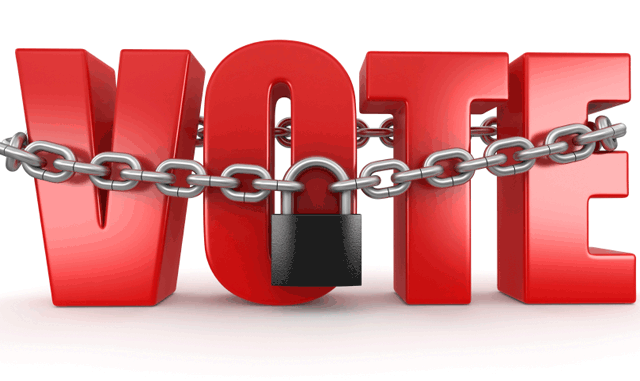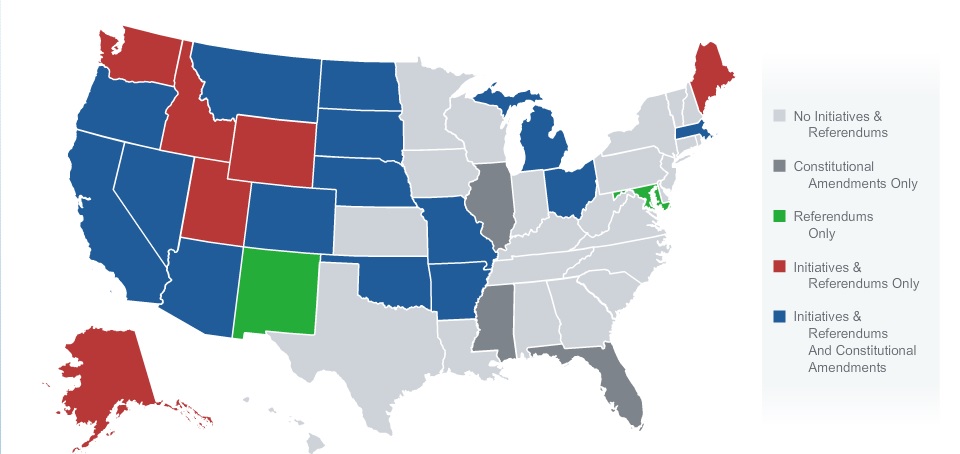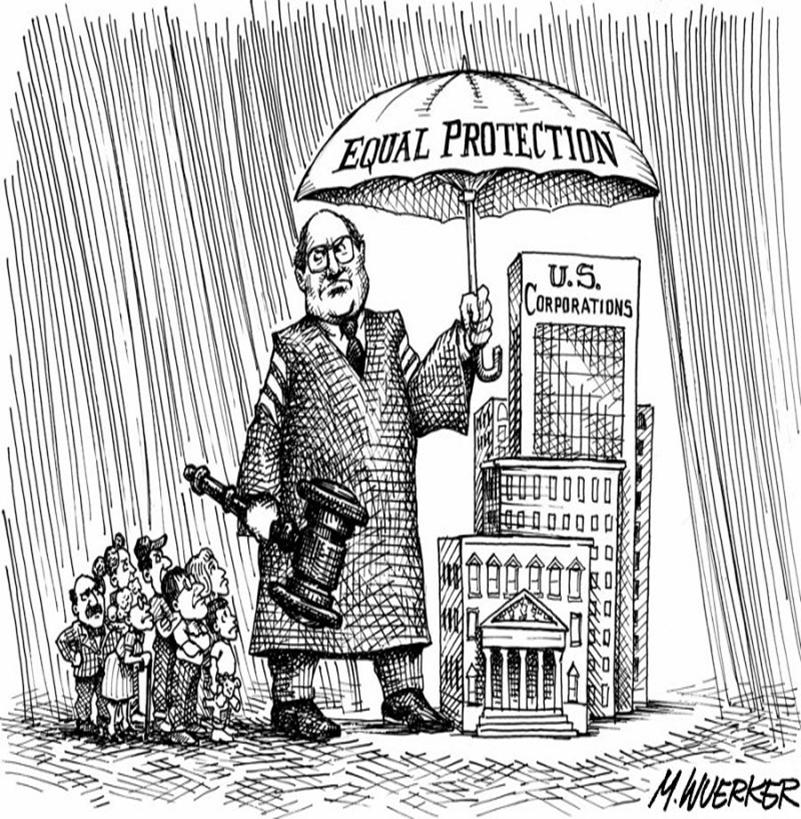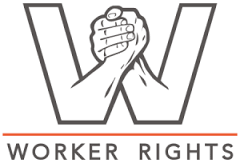Are we able to democratically stop fracking and other threats to biodiversity? Are we able to protect workers and local economies from multinational corporations? What about the police? Are we able, as a community, to stop them from targeting people of color for sanctioned violence and murder? Are we able to protect local food production from sewage sludge dumping or factory farming?
Who decides?
Communities across the country are finding that not only are we obstructed from determining what is best for our community, but we also face repression when we try.
Wealthy people hiding behind corporate automatons and organized capital are frightened of what would happen if people got used to wielding power and making real change. So, they invest amazing amounts of money toward sophisticated legal and political strategies to nip visionary local lawmaking in the bud, before it can bloom and inspire others with the simplicity and attractiveness of justice.
We’ve learned that in a democracy, it’s not enough to have the right to vote when corporations and government are able to cherry-pick what we can vote on.
CELDF is partnering with grassroots groups and statewide networks to confront the many barriers that are being erected by corporations and government to restrict our democratic rights, and our ability to act collectively to protect people, workers, communities and the environment.
Both substance and form are essential for real democracy.

How We Help
CELDF has expertise in ballot access and ballot initiative law. We are resisting a corporate-led, nationwide attack on direct democracy. A wave of state legislation have swept the nation, hindering access to the ballot for grassroots groups. Corporate-led litigation also ties campaigns up in court and keeps measures important to communities — but inconvenient for profiteers — off the ballot. The courts have been complicit.
We are at the forefront of efforts to protect the right of direct democracy for people challenging corporate power.
Our work includes rigorous defense of ballot initiative petitioner rights in states including Ohio, Pennsylvania, New Hampshire, Oregon, Washington and Colorado. Through this work we take on some of the most powerful corporate lobbies and law firms in the nation.
As you’ll see below, CELDF witnesses tremendous repression of the democratic rights of communities when they challenge undemocratic legal doctrines and work to introduce change into the DNA of our power structure.
This repression includes targeted backlashes from state legislatures and courts to systematically undermine the scope of democracy.
Not Backing Down to the Big Wigs
Our small team of dedicated attorneys is not intimidated. For example, in Ohio, we are taking on the American Petroleum Institute and the State of Ohio, as we defend petitioners’ rights to put to a vote local Rights of Nature laws. We have taken on comparably powerful lobbies in other states. Corporate boards of directors are clearly coordinating their anti-democratic efforts nationwide.
Our staff has come to understand that engaging this battle over democratic rights is part of a larger mission to organize for community, environmental, economic, and ecosystem rights. Therefore, CELDF’s work is not only aimed at expanding and securing rights of communities, workers, and nature, but also on securing basic democratic rights.
Communities Demand More Equitable Access to the Law
Corporate actors draft laws and propose them to lawmakers after funding their campaigns. Meanwhile, people and their communities are left out of decision-making that will impact the environment, civil rights, and their quality of life.

Corporate interests mold state and federal laws while simultaneously blocking direct democracy initiatives from being voted on. We see it at work in state legislatures with bills being introduced and passed that prevent communities from making decisions about their local economy or local environment. As well, the massive spending by corporations in our electoral processes makes the voices of the people almost impossible to hear.
Thus, CELDF is working to:
- Protect the ballot initiative: Corporate wealth and our own governments are blocking community members and grassroots groups from introducing and voting on ballot initiatives; CELDF is fighting to protect grassroots access to the initiative process.
- Stop government “ceiling” preemption: States are interfering in local democratic decision-making on environmental, social, economic, and matters of governance; CELDF is organizing to secure the right of local, community self-government, so that communities have the authority to broaden rights and enforce legal protections.
- End corporate money in politics: A tidal wave of corporate wealth is drowning out the voice of the people; CELDF is working on local law-making efforts to protect our elections from domination by organized capital by addressing the root causes that allow corporations more “rights” in our electoral process than people themselves.
CELDF works in each of these areas – partnering with community groups, grassroots organizations, unions, neighborhood councils, municipal governments, and Community Rights Networks – to advance rights and counter efforts that interfere and block democratic rights.
Got questions or ideas to share? Get in touch!
Interested in Learning More About Direct Democracy?
Keep Reading!
Defending the Right to “Direct Democracy” – Protecting the Ballot Initiative
In 1898, South Dakota became the first state in the United States to codify the ballot initiative process in its state constitution, recognizing the authority of the people of the state to amend the state constitution directly. This came amid growing frustration and resistance building across the country in response to heightening corporate power. Of particular concern was the power of the railroad corporations and the politicians they controlled. Instituting the initiative power in South Dakota was “seen by both voters and legislators as a way to reform democracy by making it more responsive to the people.”
Today nearly half of the states in the United States have some form of state-level ballot initiative process.

Reprinted from CitizensinCharge.org http://www.citizensincharge.org/states
The ballot initiative is a process by which people can draft a law and petition to put it on the ballot. It is often described as a form of “direct democracy” whereby residents are able to propose and directly enact a law without the involvement of elected officials.
In some states, initiatives can be proposed at the local and state level to establish new laws and amend existing laws. In states such as Colorado and Oregon, the initiative may also be used to amend the state constitution.
The initiative has been exercised over the past century to do many things, including to expand democratic and civil rights, such as the right to vote for women, as well as to pass regressive measures. Today, it’s use by grassroots groups organizing to protect teachers, workers and the environment is exploding, showing that direct democracy can play an important role into the future.
CELDF is working with communities and groups, along with state Community Rights Networks, to protect and advance community, social, economic, environmental and ecosystem rights. Often this occurs with people coming together to advance ballot initiatives in their community or state.
We Have Directly Experienced Backlash From Corporations and Governments Seeking to Undermine Democratic Rights

See more Matt Wuerker cartoons at http://www.politico.com/wuerker/
The initiative is often used when elected representatives either will not or cannot make the changes people believe are necessary. The rising popularity of the ballot initiative can also be attributed to heightened corporate control over state legislatures. The ongoing backlash, and the success of organized capital in nullifying meaningful initiative powers across the country, supports this conclusion.
As more and more people exercise democratic rights to protect people and the Planet and to further democratize society, there is increasing pushback from corporations and our own governments.
For instance, in Oregon, agribusiness interests have repeatedly sought to block local initiatives that would ban genetically modified agriculture. In Colorado, the oil and gas industry has twice filed pre-qualification challenges to block an initiative to amend the state constitution. In Spokane, WA, our local partner group, Envision Spokane, qualified their Community Bill of Rights for the ballot. The Spokane City Council then voted to place the initiative on the ballot. Despite this, businesses joined with elected officials to sue Envision Spokane to keep the measure from a vote of the people.
In their legal challenge, corporate and government interests argued that the people of the community didn’t have the authority to protect their neighborhoods, the Spokane River, or workers. In early 2016, the Washington Supreme Court agreed, ruling that the interests of corporations outweigh the democratic authority of the people of Spokane to vote on the measure, permanently blocking the initiative from reaching the ballot. It was a massive restriction of democratic rights by the state.
Similar restrictions and precedents are being set in other states.
In states across the country, we’ve seen elected officials and local election boards actively work to keep people from exercising their right to direct democracy. We’ve also seen new state legislation enacted to specifically empower these tactics.
For example, in 2015, Ohio Secretary of State John Husted sued community groups to keep their initiatives from the ballot. CELDF’s legal team defended the right of the people to the initiative, with the Ohio Supreme Court ruling that the Secretary of State did not have the authority to take away residents’ ballot initiatives.
In Spokane, also in 2015, Mayor David Condon went to court to keep the Worker Bill of Rights initiative from the ballot. CELDF’s legal team successfully argued in court that the mayor did not have the authority to stop the measure from moving forward.
CELDF’s legal team continues to work in Oregon, Ohio, Pennsylvania, and other states to defend the right to direct democracy via the initiative. This includes providing legal counsel for our local and state partners, and ongoing civil rights litigation in Ohio.

What We Do
CELDF has been at the forefront of battles to protect and expand democratic rights, helping community members, local groups, and municipal officials protect their cities and towns and advance economic and environmental sustainability. CELDF provides grassroots organizing, legal counsel, and education to communities affected by state preemption and corporate influence in our elections through programs like our Democracy School, state-based Community Rights workshops, and grassroots organizing.
CELDF Is Defending and Expanding Rights
Nearly 200 communities across the U.S. have adopted CELDF-drafted laws establishing Community Rights, including democratic rights. From Pittsburgh, PA, to Barrington, NH; from Athens, OH, to Lafayette, CO – communities are revoking their consent to be governed by the corporate state, and are forging their way to create the communities they want for themselves and their families.
WHAT CAN YOU DO?
CELDF has been at the forefront of democratic rights, helping community members, local groups, and municipal officials establish the right to local, community self-government, to protect their cities and towns and advance economic and environmental sustainability. CELDF provides grassroots organizing, legal counsel, and education to communities affected by state preemption and corporate influence in our elections through programs like our Democracy School, state-based Community Rights Workshops, and grassroots organizing.
TAKE ACTION. STAND UP TO THE CORPORATE STATE
If you and your neighbors are being blocked from asserting your democratic rights, contact CELDF and learn how to take action. You and your community have rights, and CELDF is here to help you fight for them.
